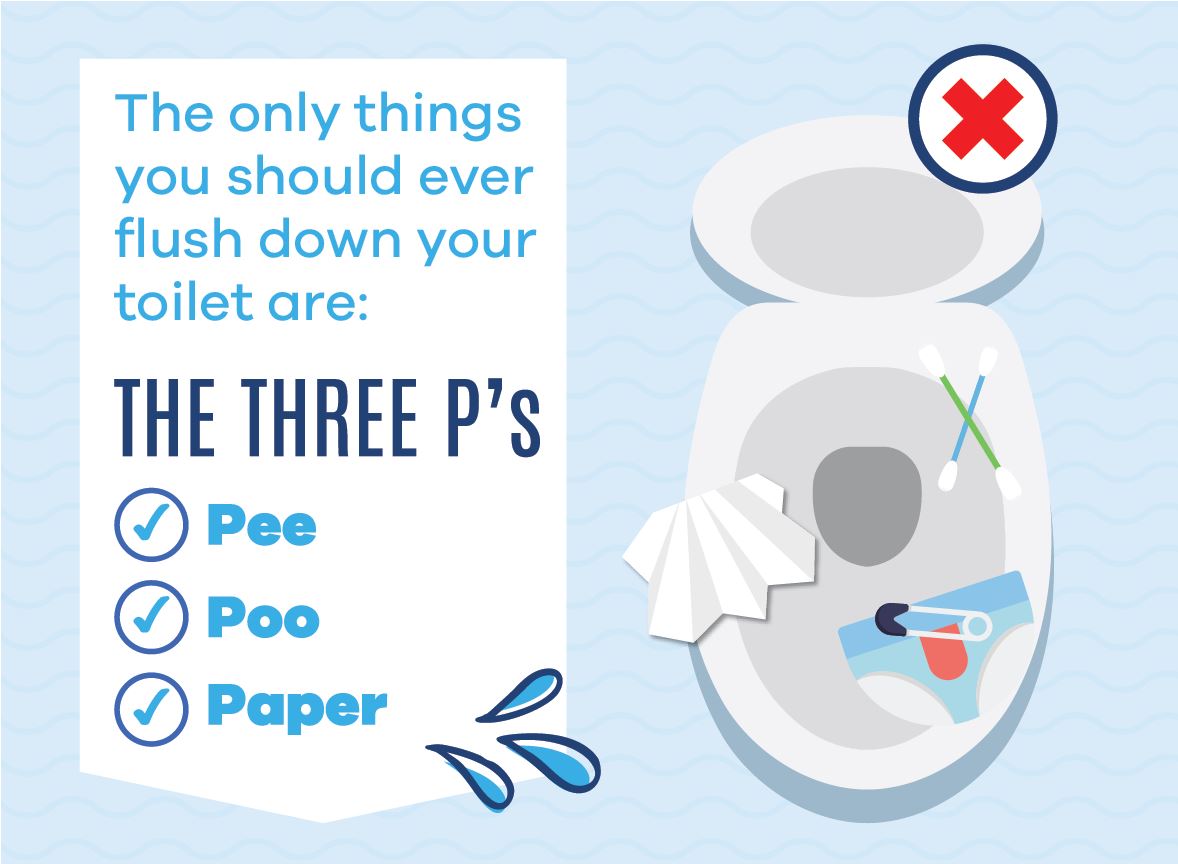Your wastewater goes through a number of stages as part of the treatment process.
Wastewater is produced from everyday activities:
- household toilets
- sinks
- showers and washing machines
- some industrial processes, such as vehicle washdown bays.
We treat this water to reduce pollutants and minimise environmental impacts. There are many different processes we use to do this, including:
- biological treatment
- chemically assisted sedimentation
- an activated sludge process.
After we treat your wastewater, it either evaporates, literally turning into thin air, or is safely discharged.
Our discharges need to be licensed under the Northern Territory's Water Act to protect these beneficial uses. View or download our waste discharge licences (WDLs) here.
What you flush makes a difference
We remove hundreds of tonnes of bathroom products, and especially wet wipes, from our wastewater treatment facilities every year.
This impacts the environment restricts the natural treatment process, which in turn causes increased odour to surrounding areas.
Remember that only the three Ps - pee, poo and paper should be flushed down the loo. Keep a rubbish bin in your bathrooms for all other items.
How we treat wastewater
Waste stabilisation ponds
All major regions have waste stabilisation ponds. These ponds are used to treat wastewater and allow it to evaporate.
Power and Water has a Waste Discharge License for selected wastewater treatment facilities. This license allows us to discharge our ponds when they reach capacity. Overflows tend to go into surrounding creeks, estuaries, swamps and rivers. Of course, this discharge occurs under strict conditions.
If you’re a commercial customer, find out more about trade waste here.
Water recycling
We can recycle water if it’s gone through an extra treatment process. Recycled water is used on a limited basis in:
- Darwin
- Pine Creek
- Katherine
- Alice Springs.
The demand for reclaimed water from large irrigation customers is increasing.
Benefits of recycling wastewater include the potential to:
- reduce watering costs
- conserve potable water
- extend watering during dry periods.
Recycled water can be used for watering public sports fields, golf courses, green spaces, tree plantations and some pastures.
All recycled water used in the Northern Territory complies with the National Health and Medical Research Council Guidelines. Reclaimed water is also subject to approval by the Department of Health and Community Services.
We manage reticulated sewerage services in 56 remote communities. Most waste travels from remote areas through pipes and pump stations to central waste treatment ponds.
Sixteen communities rely on on-site wastewater treatment systems. These treatment facilities are either privately-owned or managed by public housing.
Your health depends on reliable wastewater collection, treatment and disposal. As such, we invest in monitoring systems that help us manage and track your wastewater. Monitoring helps us restore services quickly.
We work closely with the Department of Environment, Parks and Water Security under its waste discharge licences to minimise environmental impacts by:
- monitoring and reporting on waste discharge including quality and volume
- ensuring discharge quality meets guideline values
- collecting data on wastewater systems
- continuing to understand our environment
- meeting regulatory requirements.
Problems with your wastewater
Wastewater is disposed of through pipes and pump stations to wastewater treatment plants or stabilisation ponds. At these facilities, we treat wastewater for safe disposal. Most people don't think about where water goes once they have used it. When the wastewater goes down the drain, it then passes through a number of stages as part of the treatment process.
Check whether it's due to planned works
However, at some time you may experience a problem with your toilet or sewerage service. If this happens, first check for any planned works that may need the temporary interruption of sewerage services in your area. These works are also advertised in your local paper.
When to call a plumber
If your toilet is blocked, not flushing or you have sewage or wastewater backing up through your home, you may need to call a Northern Territory licensed plumber. A plumber will tell you if the blockage is within your property or related to the sewer mains.
Your overflow relief gully could also experience a blockage. During heavy rain, the overflow relief gully ensures any sewage overflows happens outside your house. Discover more about overflow relief gullies.
Problems with easements and manholes
Some properties have an easement and a manhole leading into the sewerage system. If the manhole cover is damaged or dislodged, heavy rain could flood your local sewer. If you have a damaged or dislodged manhole cover in your yard, please report a fault. You can also read more about easements on your property here.



